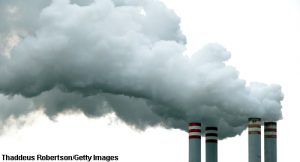 Research Suggests Climate Changes May Negatively Affect People with Rheumatic Disease
Research Suggests Climate Changes May Negatively Affect People with Rheumatic Disease
Editor’s note: ACR on Air, the official podcast of the ACR, dives into topics important to the rheumatology community, such as the latest research, solutions for practice management issues, legislative policies, patient care and more. Twice a month, host Jonathan Hausmann, MD, a pediatric and adult rheumatologist in Boston, interviews healthcare professionals and clinicians on the rheumatology front lines. In a series for The Rheumatologist, we provide highlights from these relevant conversations. Listen to the podcast online, or download and subscribe to ACR on Air wherever you get your podcasts. Here we highlight episode 56, “How Environmental Factors Impact Rheumatology,” which aired on June 20, 2023.
Physicians in many specialties are already aware of the health effects of climate change, such as how smoke from wildfires may affect a patient’s breathing capacity. Although the connection between climate change and rheumatology isn’t well established, many suspect there could be negative effects for rheumatology patients.

Dr. Dellaripa
That’s where Paul Dellaripa, MD, a member of the Division of Rheumatology at Brigham and Women’s Hospital, Boston, and founder of its Interstitial Lung Disease (ILD) Clinic , focuses his energy. Dr. Dellaripa, an associate professor of medicine at Harvard Medical School, with fellowships in both rheumatology and critical care, discussed the ways increases in heat, pollution and allergens related to climate change may negatively affect people with rheumatic disease.
Why It’s Important
First, Dr. Dellaripa discussed the known effects of climate change on those with cardiac, pulmonary and other chronic diseases.
“[Because] many of our patients have systemic diseases, it seems to make sense that those effects of climate—whether it’s heat or smoke or pollution—could theoretically affect our patients as well,” he said. “Just because we have not studied this relationship in great detail doesn’t mean that it’s not happening or going to happen. We very much need higher quality investigations into the links between climate change and health, and we also need to prepare ourselves and our patients.”
Dr. Dellaripa referred to some specific examples related to climate and health, such as wildfires causing significant exacerbations of asthma and allergies, leading to an increase in hospitalizations.1 Cardiologists have examined exacerbations due to wildfire and pollution exposure related to sudden death and congestive heart failure.2 Nephrologists have looked at populations that have been exposed to heat and found new risks of renal disease.3
When trying to pinpoint the connection to climate because it may exacerbate rheumatic conditions, Dr. Dellaripa said that immune system changes and epigenetic effects may be caused by exposure to heat, wildfire and other climate effects.
“That’s where we don’t know enough yet. … That’s where the gap in our knowledge is at this point and [what] future investigations need to be focused [on],” he said.
Climate Research
Dr. Dellaripa shared some experiences that sparked his interest in climate change and how it relates to rheumatology. More than 10 years ago, he was caring for a hospital patient who had returned from Australia after being exposed to a wildfire there that exacerbated her asthma and forced her to leave. Upon her return to Boston, she was hospitalized due to severe respiratory distress.
He also saw patients presenting with interstitial lung disease (ILD) closely after exposure to a wildfire in California.
“I couldn’t conclude clear causation between their exposure and the development of their autoimmune ILD, but it did raise the question of whether smoke due to wildfires may have played a role in the development of their disease.” Another possibility: “Patients with pre-existing rheumatic diseases may worsen with such exposures,” he said.
Dr. Dellaripa brought his concerns and research on the topic to the ACR, which formed a study group. This led to the publication of a white paper on the effects of climate change on rheumatic conditions published earlier this year.4
After analyzing 88 articles, the study team behind the white paper found that increased heat vulnerability was associated with higher odds of recurrent hospitalizations across rheumatic conditions and that air pollution was associated with an increased risk of rheumatoid arthritis (RA), gout flares and hospitalizations for systemic lupus erythematosus. Although exact causes remain unknown, the study team suggested these findings could be related to epigenetic changes, oxidative stress and inflammatory cytokines.4
More research needs to be conducted, and other disciplines, such as allergy, cardiology pulmonary and nephrology, are further ahead of rheumatology in this type of research, Dr. Dellaripa noted. However, he believes the research will continue to move forward in rheumatology with the support of professional societies, patient support groups and federal efforts.
Future research should also include a focus on how climate change has affected those who are traditionally marginalized, Dr. Hausmann says.
Dr. Dellaripa pointed to heat exposure research he was involved with that showed a significant overlap between those areas with the highest level of heat and social vulnerability.5
“All over the world, climate will affect those who are more marginalized in terms of their resources, whether it’s due to economic resources or racial disparities,” Dr. Dellaripa said.
This area of study will require more advanced mapping tools and knowledge to identify those who are most vulnerable so that healthcare leaders can assist them, limit harm and adapt to the effects of climate change.
What Rheumatologists Can Do
Dr. Dellaripa shared a few things rheumatologists and healthcare professionals can do to lower their carbon footprint and to remain conscientious about the environment. These tips include:
- Taking advantage lower cost renewable energy in healthcare settings; and
- Limiting waste in both their professional and personal lives.
In a sense, it means modifying daily life through the lens of its effect on the environment, he explained.
“In the healthcare system, our goal is to limit our emission of greenhouse gases that harm our environment and can, thus, harm our patients. Our goal is to take care of patients. We just need to find ways to do it more efficiently,” he said.
Education on these topics in medical school and graduate training is also important, and curriculum changes incorporating climate change are already happening. Examples Dr. Dellaripa gave included a climate and health committee within many medical residencies and embedding climate/health knowledge into medical school curricula.
Dr. Dellaripa also recommends considering climate when appropriate during patient education. Example: During a heat wave, Dr. Dellaripa saw a patient with renal disease who developed side effects of his medication in the setting of dehydration due to excessive heat exposure.
“Being aware which patients may be at risk for heat exposure or other climate effects is challenging for the average clinician, but it’s important that we try to find better ways to talk to and advise those patients who may be at higher risk for the effects related to climate change,” he said.
Although climate issues are obviously important, Dr. Dellaripa cautions against “hitting [patients] over the head about climate change,” he said. “They come to see you for their RA or [juvenile idiopathic arthritis] or lupus, and you don’t want to preach to people about how they need to walk more to save the planet.”
However, if you encourage patients to walk more or eat a healthier diet with less red meat to improve their health, the happy co-benefit is a positive effect on the environment.
Raising this issue in subtle ways for some and more direct ways for others can really help our patients, he said.
Vanessa Caceres is a medical writer in Bradenton, Fla.
References
- Noah TL, Worden CP, Rebuli ME, et al. The effects of wildfire smoke on asthma and allergy. Curr Allergy Asthma Rep. 2023 Jul;23(7):375–387.
- Heaney A, Stowell JD, Liu JC, et al. Impacts of fine particulate matter from wildfire smoke on respiratory and cardiovascular health in California. Geohealth. 2022 Jun 3;6(6):e2021GH000578.
- Qu Y, Zhang W, Boutelle AYM, et al. Associations between ambient extreme heat exposure and emergency department visits related to kidney disease. Am J Kidney Dis. 2023 May;81(5):507–516.e1.
- Dellaripa PF, Sung LH, Bain PA, et al. American College of Rheumatology white paper: The effects of climate change on rheumatic conditions—an evolving landscape and a path forward. Arthritis Rheumatol. 2024 May 15.
- Santacroce L, Dellaripa PF, Costenbader KH, et al. Association of area-level heat and social vulnerability with recurrent hospitalizations among individuals with rheumatic conditions. Arthritis Care Res (Hoboken). 2023 Jan;75(1):22–33.
More Episodes
A new episode of ACR on Air is released twice a month. Listen to this full episode and others online at acronair.org. Or download and subscribe wherever you get your podcasts.



